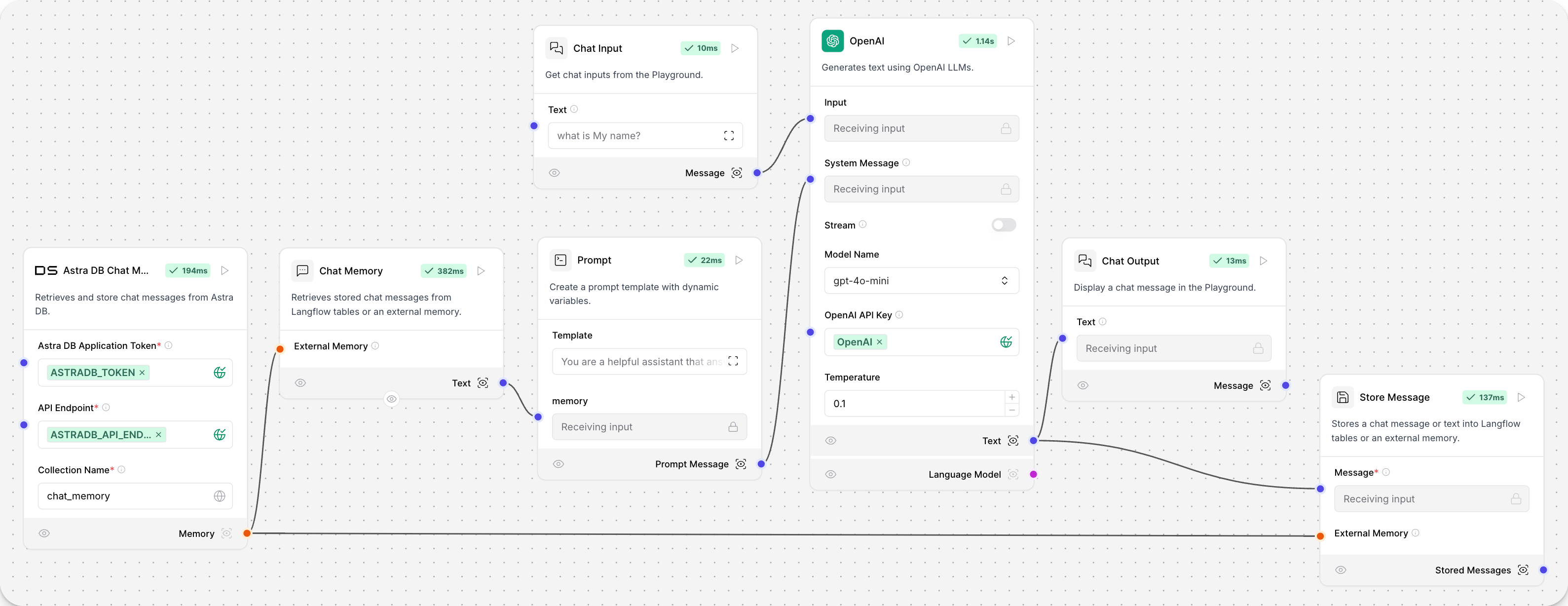Memory components in Langflow
|
This Langflow feature is currently in public preview. Development is ongoing, and the features and functionality are subject to change. Langflow, and the use of such, is subject to the DataStax Preview Terms. |
Memory components store and retrieve chat messages by session_id.
They are distinct from vector store components, because they are built specifically for storing and retrieving chat messages from external databases.
Memory components provide access to their respective external databases as memory. This allows Large Language Models (LLMs) or Agents to access external memory for persistence and context retention.
Use a memory component in a flow
This example flow stores and retrieves chat history from an Astra DB Chat Memory component with Store Message and Chat Memory components.
The Store Message helper component stores chat memories as Data objects, and the Message History helper component retrieves chat messages as Data objects or strings.

AstraDB Chat Memory Component
This component creates an AstraDBChatMessageHistory instance, which allows for storing and retrieving chat messages using Astra DB.
Parameters
Name |
Type |
Description |
collection_name |
String |
Name of the Astra DB collection for storing messages. Required. |
token |
SecretString |
Authentication token for Astra DB access. Required. |
api_endpoint |
SecretString |
API endpoint URL for the Astra DB service. Required. |
namespace |
String |
Optional namespace within Astra DB for the collection. |
session_id |
MessageText |
Chat session ID. Uses current session ID if not provided. |
Name |
Type |
Description |
message_history |
BaseChatMessageHistory |
An instance of AstraDBChatMessageHistory for the session. |
Component code
astra_db.py
404: Not FoundCassandra Chat Memory Component
This component creates a CassandraChatMessageHistory instance, enabling storage and retrieval of chat messages using Apache Cassandra or DataStax Astra DB.
Parameters
Name |
Type |
Description |
database_ref |
MessageText |
Contact points for Cassandra or Astra DB database ID. Required. |
username |
MessageText |
Username for Cassandra (leave empty for Astra DB). |
token |
SecretString |
Password for Cassandra or token for Astra DB. Required. |
keyspace |
MessageText |
Keyspace in Cassandra or namespace in Astra DB. Required. |
table_name |
MessageText |
Name of the table or collection for storing messages. Required. |
session_id |
MessageText |
Unique identifier for the chat session. Optional. |
cluster_kwargs |
Dictionary |
Additional keyword arguments for Cassandra cluster configuration. Optional. |
Name |
Type |
Description |
message_history |
BaseChatMessageHistory |
An instance of CassandraChatMessageHistory for the session. |
Component code
cassandra.py
404: Not FoundMem0 Chat Memory
The Mem0 Chat Memory component retrieves and stores chat messages using Mem0 memory storage.
Parameters
| Name | Display Name | Info |
|---|---|---|
mem0_config |
Mem0 Configuration |
Configuration dictionary for initializing Mem0 memory instance. |
ingest_message |
Message to Ingest |
The message content to be ingested into Mem0 memory. |
existing_memory |
Existing Memory Instance |
Optional existing Mem0 memory instance. |
user_id |
User ID |
Identifier for the user associated with the messages. |
search_query |
Search Query |
Input text for searching related memories in Mem0. |
mem0_api_key |
Mem0 API Key |
API key for Mem0 platform (leave empty to use the local version). |
metadata |
Metadata |
Additional metadata to associate with the ingested message. |
openai_api_key |
OpenAI API Key |
API key for OpenAI (required if using OpenAI embeddings without a provided configuration). |
| Name | Display Name | Info |
|---|---|---|
memory |
Mem0 Memory |
The resulting Mem0 Memory object after ingesting data. |
search_results |
Search Results |
The search results from querying Mem0 memory. |
Component code
mem0_chat_memory.py
404: Not FoundRedis Chat Memory
The Redis Chat Memory component retrieves and stores chat messages using Redis.
Parameters
| Name | Display Name | Info |
|---|---|---|
host |
hostname |
The IP address or hostname of the Redis server. This is required to establish a connection to the Redis instance. |
port |
port |
The port number on which the Redis server is listening. The default Redis port is 6379. |
database |
database |
The Redis database number to use. Redis supports multiple databases, identified by integers. The default is usually 0. |
username |
Username |
The username for authenticating with the Redis server. This is used if Redis is configured with access control lists (ACLs). |
password |
Password |
The password associated with the username for Redis authentication. This should be kept secure and not exposed in plain text. |
key_prefix |
Key prefix |
A string prefix added to all keys stored in Redis for this chat memory. This helps in organizing and isolating keys for different applications or purposes within the same Redis instance. |
session_id |
Session ID |
A unique identifier for the chat session. This is used to retrieve and store messages specific to a particular conversation or user session. |
| Name | Display Name | Info |
|---|---|---|
message_history |
Message History |
A |
Component code
redis.py
404: Not FoundZep Chat Memory Component
|
This component is in Legacy. Legacy components can be used in flows, but may not work due to Langflow core updates. Instead, use the AstraDB Chat Memory component. |
This component creates a ZepChatMessageHistory instance, enabling storage and retrieval of chat messages using Zep, a memory server for Large Language Models (LLMs).
Parameters
Name |
Type |
Description |
url |
MessageText |
URL of the Zep instance. Required. |
api_key |
SecretString |
API Key for authentication with the Zep instance. |
api_base_path |
Dropdown |
API version to use. Use |
session_id |
MessageText |
Unique identifier for the chat session. Optional. |
Name |
Type |
Description |
message_history |
BaseChatMessageHistory |
An instance of ZepChatMessageHistory for the session. |
Component code
zep.py
404: Not Found